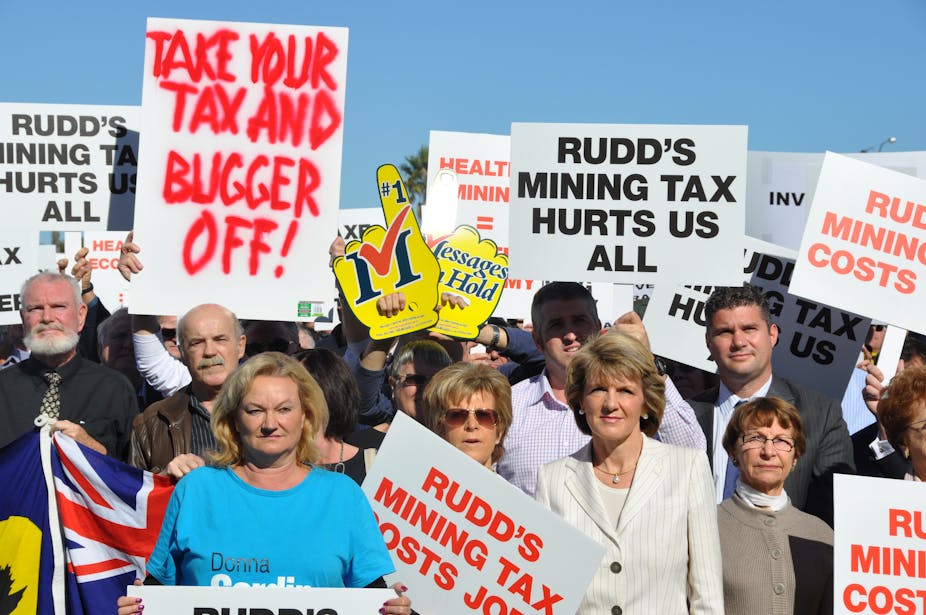Now that Gina Rinehart has more than doubled her fortune in one year to top the 2011 BRW Rich 200 list, she will no doubt see her contribution to last year’s $22 million campaign to stop Labor’s resources tax as one of her wisest ever investments.
Remember those photos of the rich demonstrating in Perth in against the Rudd Government’s miner (and minor) tax last June? Journalist Kathy Marks from the UK’s The Independent described the Rinehart’s place in the scene well:
“Gina Rinehart’s pearls glistened in the sunlight as she bellowed through a megaphone: ‘Axe the tax!’”
The campaign was a huge success for Rinehart’s Hancock Prospecting and other mining companies. Labor dumped Kevin Rudd as prime minister not long after the campaign began and the new Gillard Government developed the minerals resource rent tax – a weak compromise with the big three mining companies that will see revenue collected on average of $10 billion a year less than the original tax.
The results of this resource tax back down for the future are becoming obvious.
The wealth of those on the rich list increased 23% over the last year – roughly the same increase needed to give community sector workers equal pay for equal work.
Rinehart’s increase in wealth alone – about $5 billion – would pay for an increase in community sector salaries to an equitable level and have plenty left over for public schools and hospitals, for public transport and investment in renewable energy.
Rather than looking at the issue of wealth through the prism of property relations alone, maybe a better explanation is this: we do the work and they get the profits.
Rinehart’s riches are built on mining, and she is diversifying into the media in anticipation of the China bubble bursting.
Four of the top five on the rich list made their lucre from mining.
In the second half of 2010, the underlying half year profit of BHP Billiton was almost $15 billion. Xstrata’s profit last year rose by 75% to $7.7 billion. Rio Tinto’s annual net profit almost tripled to $14.2 billion in 2010.
Meanwhile, we as a nation are left “too poor” to provide decent public health care, schools, transport and shift to renewable energy, simply because Labor doesn’t have the nerve to tax the big miners.
Labor’s gutlessness is part of a wider malaise – the idea that what is good for bosses is good for workers. This approach has pervaded the thinking and action of the leadership of Australian trade unions for the last 30 years.
The end result has been, apart from a large decline in union membership, a massive shift in wealth to capital from labor, a deliberate strategy by all sections of the business community and their accomplices in the labour movement to address declining profit rates.
As Federal Labor MP Andrew Leigh points out in his book Mind the Gap, in “2007 the top 1% per cent had 10% of household income, double the share in 1980”.
The position for the top 0.1 percent is even starker. Leigh writes, “by 2007, the richest 0.001 of all Australians again had 4% of household income”.
This is but a surface expression of something much deeper going on – a profound redistribution of wealth from workers to bosses.
Clearly tax can be a mechanism for progressive redistribution from the rich to poor. However, tax policy in the past three decades has been dominated by attempts to do the exact opposite – to reduce the burden of tax on the rich.
The Henry Tax Review of last year, stripped to its essence, was about continuing and accelerating that trend.
Likewise, the carbon tax is about making workers pay for the pollution of the profiteers.
The Australian Council of Trade Unions is hardly a bastion of radicalism. According to an ACTU Economic Bulletin last year, “the profit share of national income is now near the record highs it reached in 2008, while the wages share of income is the lowest since 1964”.
But what is the ACTU doing about this? How can this be reversed? Apart from property taxing the rich, something Labor won’t really do, there is another way workers in Australia can redistribute wealth. It’s by taking action on the job to win back some of the profit share that has gone to the bosses.
It is clearly time for workers to fight for real wage increases to end the obscenity of the super rich wallowing in their under-taxed billions.

